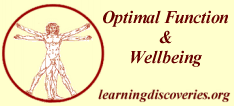|

|
Learning Discoveries Psychological Services
Rosemary Boon Registered Psychologist
M.A.(Psych), Grad. Dip. Ed. Studies (Sch.Counsel), Grad. Dip. Ed., B.Sc., MAPS, AACNEM. |
|
Telephone and Facsimile:
Sydney (+61 2) 9727 5794 |
Email:
rboon@iprimus.com.au |
Address:
P.O. Box 7120
Bass Hill NSW 2197
Australia |

SITE MAP
Home / About L.D.P.S & Services Offered / Learning Disabilities / Attention Deficit/Hyperactivity Disorder / The Learning Pyramid /
Articles, Papers & Information Sheets / Classes & Workshops / Related Links & Resources & References / Client Feedback


Classes in Meditation and Relaxation Techniques
Meditation has existed since man first rose to true consciousness.
Every culture has one form of meditation or another, and today many of these techniques are being utilised in conjunction with various healing modalities as well as for inspiration and relaxation.
So, what exactly is meditation?
Meditation is not a mystical experience (although it can be used to attain such experiences) it is simply a means to achieve a relaxed state in which the brain naturally slips into the ‘alpha’ state. Here we are able to tap into our deeper levels of awareness. It is here that we relax both body and mind to reach a calm state that naturally opens long term memory function and facilitates understanding and learning.
Meditation is achieved through the conscious blocking of external stimuli through some form of monotonous, repetition – either sound, posture, visual image or simply focussed concentration of the normal breathing process.
Our nervous system habituates when it receives an unvarying stimulus for a period of time so that it is effectively ‘unaware’ of that stimulus. So, we effectively shut off the input and processing of the external stimulus to ‘get away’ for a while from the external environment – a ‘holiday’ without the expense of having one.
When we return to ‘normal’ awareness after meditation, we find that when we introduce the same sensory inputs later, we are actually see it differently or "anew".
This form of meditation is known as "concentrative meditation".
However, other forms of meditation such as Zen, train their meditators to maintain a heightened state of awareness throughout instead of blocking the external stimulus – they seek to remain aware of the here and now moment without getting carried away into discursive thoughts. This is called "open meditation".
During ‘concentrative" meditation, we focus on mental imagery, while "open" mediators focus on varied sensory input.
The effect in both cases is to exclude rational, conceptional thought as well as worries and disturbing ‘fantasies’ in general. Such a redirection of attention is not easy at first, and beginners are often surprised at how much of a chatterbox their own mind can be – it is in fact quite incessant and resistant to conscious control. However, as meditators we can learn to exclude distracting thoughts, and the relaxation thus achieved is accompanied by relaxation more profound than merely sitting quietly. Often we will find that the absorption in meditation and exclusion of other concerns is accompanied by feelings of euphoria. But do not expect this to be the case in the beginning, and of course such feelings will inevitably vary for each individual.
What are the physical benefits of Meditation?
Meditation has the effect of slowing respiration and decreasing the heart rate, thus lowering blood pressure. Because it creates a state of deep relaxation, meditation has several health benefits including strengthening the immune system and improving circulation, as well as increasing perceptual ability and decreasing anxiety. It is particularly effective in managing ailments aggravated by tension, eg: insomnia, pain, and breathing difficulties.
When you are tense, anxious or feeling out-of-kilter, you are usually not breathing fully, cutting off oxygen – which facilitates energy flow in the body, which in turn perpetuates further tension, anxiety etc. It is amazing what simply stopping and breathing will do to alleviate stress and create a clear mental and emotional atmosphere in which to proceed.
This course is structured to take you from the basic level of breathing and breath control, through relaxation, to the various methods of attaining the relaxed state attained in the meditative process (focus, mantra, visualisation, and key thoughts).
It is suggested that you practice with due diligence the exercises outlined and set aside an area at home where you will not be disturbed.

To enrol, or to obtain more information about the
Meditation and Relaxation classes
Please Phone or Fax : +61 2 9727 5794
Email:
rboon@iprimus.com.au


